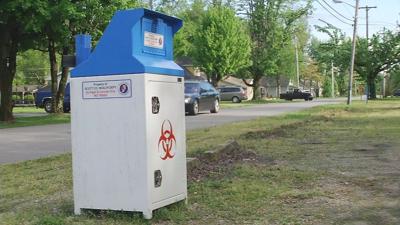AUSTIN, Ind. (WDRB) -- The city of Austin has voted to restore its Syringe Services Program (SSP), also known as syringe exchange program (SEP). The vote follows a decision by Scott County leaders to end its county-wide program next month.
The program provides a range of services, including linkage to substance use disorder treatment, access to and disposal of sterile syringes and injection equipment, and vaccination, testing, and linkage to care and treatment for infectious diseases, according to the Centers for Disease Control and Prevention.
Back in 2015, Indiana's Scott County made national headlines over IV drug use and sharing needles leading to an HIV outbreak.
Austin was deemed the epicenter of Indiana's HIV outbreak, and that’s where the county’s needle exchange began.
Mike Pence, who was Indiana's governor at the time, approved the program in the city. In April 2015, 135 people became infected with HIV, according to CDC data.
In 2020, Scott County had fewer than five new HIV cases, according to state health department reports. Hepatitis C infection rates had also decreased to almost two-thirds since 2015.
Health officials claimed the needle exchange helped significantly decrease the spread, and Scott County commissioners felt more inclined to end the program in a 2-1 vote.
Now, the city of Austin is working to keep the program going.
On Nov. 9, Austin City Hall was packed with residents and recovery advocates when councilmembers approved to restore the city’s syringe services program in a 2-3 vote.
Since then, there have been mixed feelings from community members, councilmembers and outreach programs.
Phil Stucky, the Executive Director of THRIVE, a program that helps others recover from their addictions, is optimistic.
"Just from the syringe service program alone, we've had over 417 referrals for people to start their journeys," Stucky said.
Scott County has been the nation's model when it comes to containing a historic HIV outbreak. Its needle exchange program responded directly to the outbreak, believed to have spread through shared-needle injections of opioid drugs.
"I think as long as we're not having an educated conversation about it, it's always going to look nasty,” Stucky said, adding that decades of studies have found that syringe exchanges reduce infections.
"Scott County had a 92% return rate on its syringes that is way beyond any syringe program that's out there now,” he said.
As of Thursday, 1,007 people in Indiana have died from an opioid overdose. That is almost 50% fewer people than last year's record of 1,875 deaths, according to state government data.
Some across the county still balk at the idea of using public resources for drug use, but Stucky said it is much more than just feeding drug addictions. He says the program gives addicts a fighting chance if or when they are ready to receive help.
"There are people out there that are actively using," said Stucky, suggesting a vote like the one made by councilmembers approving the program this year will additionally add to the slowing spread of diseases across the county for years to come.
Related Stories:
- Southern Indiana needle exchange program that helped curb HIV outbreak to be shut down
- Scott County's needle exchange program could be one step closer to ending
- Supporters of embattled needle exchange in Scott County say it's solving an ugly, dangerous problem
- Cutting needle exchange could cost Scott County millions, sheriff warns
- Top doctors say HIV will spread if Scott County leaders cut needle exchange program
- Scott County leaders to decide future of needle exchange program
- New CDC report says needle exchange in Scott County, Indiana, is working
Copyright 2021 WDRB Media. All Rights Reserved.











